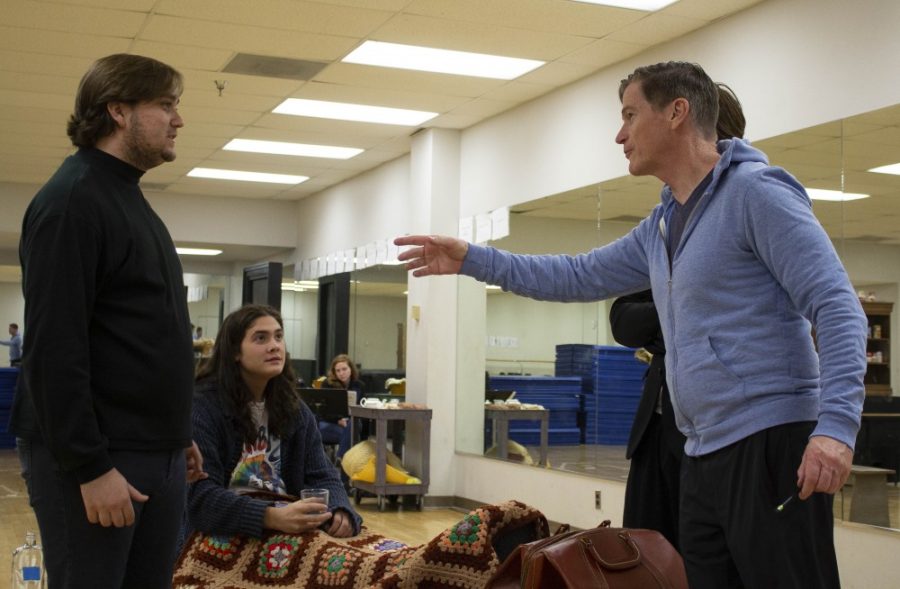Hank Stratton has had his foot in the entertainment business for many years. As a graduate of the London Academy of Music and Dramatic Art, he has since acted on Broadway and appeared in a number of films and TV series.
Stratton said he loves working as an actor, but even early in his career, he felt that practicing only that trait was holding him back.
“I’ve always been a dramaturge, and I noticed that one of the reasons I wanted to direct is that I felt limited as an actor,” Stratton said. “There were things about the process that I felt that I was being held back as a creative artist.”
RELATED: The Arizona Repertory Theatre welcomes the Inishmaan to the stage
Now, Stratton works as an assistant professor at the University of Arizona School of Theatre, Film & Television. He is active in the school as head of the recruitment committee and as a director.
“I feel like I’m never more creative, I feel like I’m never more plugged into the process than when I’m directing,” Stratton said.
He said he loves telling a story, but what really drives him as a director is watching young actors or designers unlock things within themselves, things they didn’t know where locked, or skills they didn’t know where there to learn. Stratton calls this the “moment of discovery.”
He looks back at his years on Broadway as a “dream come true” and an experience that has really shaped the way he works as a director.
“I was working with the best of the best, and what I try to do here at the university is mirror those professional standards and expectations,” Stratton said.
His colleague Kevin Black has worked with him many times and has seen Stratton’s directing process first-hand.
“I think Hank in particular makes sense to actors,” Black said. “He’s an actor himself and he speaks the language really well, and I think he has a great eye in knowing what an actor needs to hear to bring their awareness into something they might not be aware of earlier.”
Black also said that Stratton’s background in acting gives him a leg up on directors who have not been trained as actors previously. According to Black, those directors can see the end result they need, but have a difficulty in giving feedback to actors in such a way that they understand what is needed and how to get there.
RELATED: Commentary: Cripple of Inishmaan: Rehearsals from an outside point of view
“I think good directors and smart directors will say, ‘How are we going to do this?’ and pose that question to the cast and then it becomes a collaboration,” Black said. “I definitely think that’s Hank’s leadership style.”
According to Black, Stratton doesn’t seem to come in with a completely planned-out set of notions. As an outsider looking into the creative process, he said he notices that there is creativity happening as a play is rehearsed.
“I think he’s very open to ideas as he moves through a set of ideas he already has,” Black said.
Stratton echoes Black by saying there is a tremendous amount of trust involved and that the more experience he has as a director, the more it clicks.
“I think when I was a younger director I panicked and worried that I wouldn’t have all the answers,” Stratton said. “What I’ve figured out is that I don’t need to have all the answers, but they unfold organically.”
Cole Rowerdink, a senior in the Stage Management program of the School of Theatre, Film & Television, echoed what Black said, stating that Stratton does a good job of relaying his concepts and ideas to both the actors and designers.
Rowerdink is working with Stratton on “The Cripple of Inishmaan” as the stage manager. He and Stratton work closely during the weeks prior to, and during the production of, the play.
Rowerdink not only credits Stratton as someone who is good at what they do, but also also a role model and a big help to the students he works with.
“I think people look up to him. As a teacher, he wants the best for his students,” Rowerdink said. “We have senior showcase coming up, and he’s very productive in bringing specific agents to town and making sure that the students that are here get the best education and overall experience. One, because they’re paying for it, and two, they’re like his children. He really treats us like his family, and I think that’s important.”
Follow Daily Wildcat on Twitter









